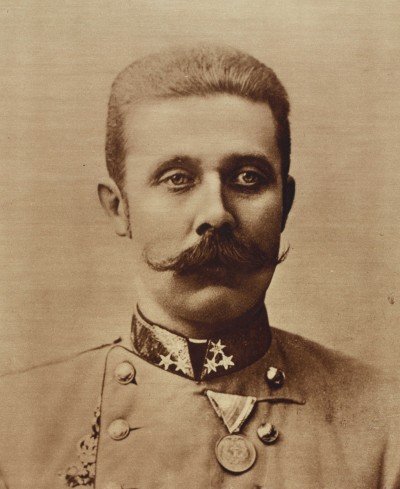
Archduke Franz Ferdinand:
The Man Whose Death Shaped a Century
Archduke Franz Ferdinand of Austria (1863–1914) is a figure whose name is indelibly linked to the cataclysmic events of the early 20th century.
As the heir to the Austro-Hungarian Empire, his assassination in Sarajevo on June 28, 1914, set off a chain reaction that plunged the world into World War I. While his life was cut short before the outbreak of World War II, his legacy continues to reverberate through the geopolitical shifts that followed the Great War, which ultimately laid the groundwork for the conflicts of the 20th century. This blog post examines the life of Franz Ferdinand, his role in the Austro-Hungarian Empire, and the profound impact of his assassination.
Early Life and Rise to Prominence
Born on December 18, 1863, in Graz, Austria, Franz Ferdinand Carl Ludwig Joseph Maria was the eldest son of Archduke Karl Ludwig, brother of Emperor Franz Joseph I. The Habsburg dynasty, one of Europe’s most powerful royal families, ruled a vast, multi-ethnic empire that spanned modern-day Austria, Hungary, and parts of the Balkans, Central Europe, and Italy. Franz Ferdinand’s path to becoming heir presumptive was not straightforward. The suicide of Crown Prince Rudolf in 1889 and the death of his father in 1896 elevated him to the position of heir to the Austro-Hungarian throne.
Franz Ferdinand was known for his keen interest in the military. By 1913, he had risen to the rank of inspector general of the Austro-Hungarian armed forces, granting him significant influence over military policy. However, his vision extended beyond martial matters. He advocated for a restructuring of the empire into a federal union, often referred to as the “United States of Greater Austria,” to address the growing ethnic tensions within the diverse empire. This proposal aimed to grant greater autonomy to the empire’s various nationalities, a reform that was controversial among the conservative Habsburg establishment.
Personal Life and Controversies
Franz Ferdinand’s personal life was marked by a significant departure from Habsburg tradition. In 1900, he married Sophie Chotek, a Bohemian noblewoman whose lack of royal lineage made her an unsuitable match in the eyes of the imperial court. The marriage was morganatic, meaning Sophie could not share her husband’s titles, and their children were excluded from the line of succession. Despite this, Franz Ferdinand’s devotion to Sophie was unwavering, and their relationship humanized the often-stoic archduke. The couple’s decision to travel together to Sarajevo in 1914, despite known risks, reflected their commitment to presenting a united front.
The Assassination That Changed the World
On June 28, 1914, Franz Ferdinand and Sophie were assassinated in Sarajevo by Gavrilo Princip, a Bosnian Serb nationalist and member of the Black Hand, a group seeking South Slavic independence from Austria-Hungary. The couple was in Sarajevo to observe military maneuvers and promote goodwill in a volatile region. The assassination was the culmination of a series of attempts that day, including a failed bombing earlier in the morning. After a wrong turn by their driver, Princip seized the opportunity to shoot both Franz Ferdinand and Sophie at close range.
The assassination triggered the July Crisis, a diplomatic frenzy that exposed the fragility of Europe’s alliance system. Austria-Hungary, backed by Germany, issued an ultimatum to Serbia, where the Black Hand operated. Serbia’s partial compliance failed to avert conflict, and Austria-Hungary declared war, setting off a domino effect. Russia mobilized to support Serbia, Germany declared war on Russia and France, and Britain entered the fray, leading to the global conflict of World War I.
Legacy and Connection to World War II
While Franz Ferdinand had no direct involvement in World War II, the consequences of his assassination were profound. World War I reshaped Europe, leading to the dissolution of the Austro-Hungarian Empire and the creation of new nation-states. The Treaty of Versailles, which ended the war, imposed harsh penalties on Germany, fostering resentment that contributed to the rise of Adolf Hitler and the outbreak of World War II in 1939. Additionally, the ethnic and territorial disputes in the Balkans, exacerbated by the empire’s collapse, remained a source of tension through the 20th century.
Franz Ferdinand’s vision for a federalized empire might have mitigated some of these tensions, but his death ensured that his ideas remained untested. His assassination is often described as the spark that ignited the powder keg of pre-war Europe, highlighting the fragility of the early 20th-century geopolitical order.
Archduke Franz Ferdinand’s life was marked by his efforts to reform a crumbling empire and his devotion to his family, but it is his death that cemented his place in history. The assassination in Sarajevo was not merely a personal tragedy but a pivotal moment that unleashed a century of conflict and transformation. Understanding Franz Ferdinand’s life and legacy offers insight into the complex interplay of nationalism, imperialism, and diplomacy that defined the modern era. His story reminds us how a single event can alter the course of history, with consequences that echo across generations.